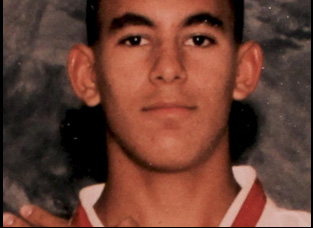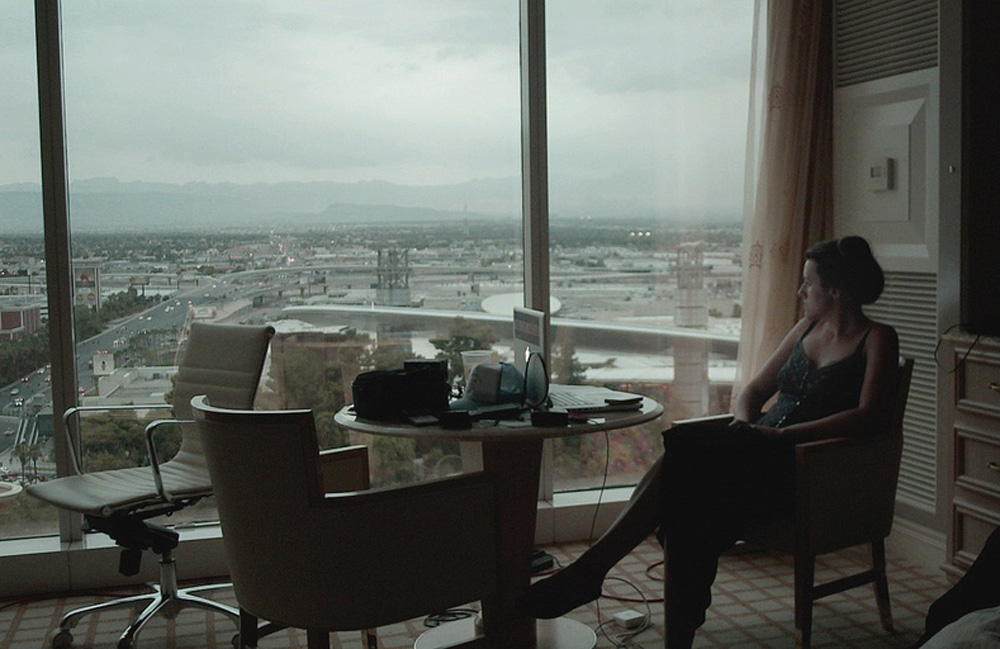There are many metaphors to be made about Las Vegas, a city laced with bright lights to mask the desert it sits in, but when John D’Agata first wrote “About a Mountain,” he stumbled upon one that hadn’t been made before about the city when conducting a deep dive into the region’s intake of nuclear waste intended for recycling at Yucca Mountain, contaminating the land and potentially clouding the way that people see their lives when having to navigate around the reality that they’re presented with. As a writer, D’Agata had become equally untethered from notions of observational truth, feeling that statistics and stated facts could conflict with what he understood emotionally, and saw a through line to the death of Levi Presley, a teenager who left family and friends without answers when he climbed to the top of the Stratosphere Hotel on the strip to take his own life.
It was an investigation that D’Agata only went so far in conducting when, admittedly, he would often let his mind fill in the rest, more interested in a broad question of what is truth than the truth of the situation at hand, but it becomes a baton that Frances Henderson picks up with an equal amount of curiosity and provocation in “This Much We Know,” driven to Sin City by the questions raised in D’Agata’s book as well as her own personal search for something to hold onto in the wake of a friend’s seemingly inexplicable suicide. Henderson, an editor of such documentaries as “For Akeem” and “Shut Up and Paint,” certainly knows that even in the most factually accurate nonfiction, it is a product of perspective and goes about a traditional process of making a documentary about the subjects that D’Agata spoke to in his book while processing them in an unconventional way, illuminating the elements that come to shape experience and memory subconsciously and augment perception as much as create blind spots.
While Henderson is prevented from bringing the radioactive rot sitting underneath the Great Basin to the surface, you can start to imagine it looking a lot like what goes unexamined when relying too much on only what can be proven in a practical way and “This Much We Know” is equally satisfying in identifying what can never be resolved than all it does in its runtime. After wrangling a tricky story over the better part of the decade, the film has connected with audiences in Camden and DOC NYC on the festival circuit before making its way towards a national release in theaters starting this week in New York and recently, Henderson took the time to talk about relating a story in which she had to actively question her own observations, realizing how she had to be a part of the narrative, and how this adaptation aligned with more general themes in her work.

It started when I was grieving my friend’s death. She had taken her life five years prior to this conversation I had with my friend, who’s a writer, about the liberties one takes with depicting reality for a screen, [and we were] talking about nonfiction writing and she recommended this book, “About a Mountain” because the author of the book, John D’Agata, had taken a lot of artistic liberty with how he writes about reality. He has a very beautiful poetic approach and artistic interpretation, and there’s been a lot of discussion from that book around what kind of artistic practices we can imbue in reality when we’re telling real people’s stories. So I picked up the book and I was blown away by it when I read it. It’s a gorgeously written, very lyrical depiction of a very tragic situation [and it ties in] the death of Levi Presley, who took his life by jumping off the Stratosphere in Las Vegas, and I had also lost my friend to suicide, so I was grieving and trying to come to terms with what happened, questioning a lot what can I trust is real? If I saw [my friend] as being the happiest person I knew and she would take her life, [I thought] what can I know that is actually true? So I was really grappling with what is reality, and that trickled into my life as a documentary filmmaker as well.
Apart from that, it appears as if you were interested in nearing the end of life as a subject in your work as a director. Has that been of ongoing interest or coincidental?
You’re referring to my other film [“Lessons for the Living”] that I made about hospice volunteers, and I became a hospice volunteer largely because I wanted to meditate on what it meant to have your life ending, and what kind of things were coming up for you emotionally or mentally, and in films and stories, I think we’re naturally attracted to challenges and how we get through them, so that’s what I’m mostly drawn towards in my films — extreme challenges. So it’s definitely been important for me as a filmmaker to look at and wrestle with.
John D’Agata’s book leads with Yucca Mountain rather than the death of Levi Presley, but this flips the script. Was it tricky how to do an adaptation that also became your own?
Yeah, I was pretty naive [initially] about how to adapt a book into a film because this book is already so beautifully written and structured that I thought I was just going to give it some visual treatment and it didn’t work out that way. I’m still trying to unpack why doesn’t a beautifully written piece translate into a visual medium, but it’s actually a testament to why there’s filmmaking and why there’s writing. They’re just two separate ways of expressing oneself and they shouldn’t be easily translatable or transferred. So structurally, I started with the book, but struggled with it for many years because it wasn’t working as a visual representation of the book and [around] the fifth year into it, one of my producers asked me, “What is it about it that’s drawing you to the story? You could have picked up any book, so why this one?” That’s when the death of my friend came up, and I never actually made that connection [before], as odd as that sounds, so then it started to structurally be shaped around my own navigating of my grief and also this big question of what is reality? What is knowledge? How do we know things? How do we find answers to great unknowns?
What was it like to decide how much of a presence you’d actually have in the film?
That was something that I was originally not so keen on. Intuitively, I wanted the film to be narrated by an omnipresent female voice and I had all these other ideas for actors or professional voiceover people, but it just naturally made sense for me to do it. If it was going to be as personal as I was making it about my own search, then I had to do it clearly. And the writing that went into that also took many years, [honing] how you express a thought and how much do you say and how much do you hold back, because sometimes you can over-talk and over-explain, so [I’d ask] how much can the visuals do that talking for you? All that nuance about the emotional effect of the film took years to tweak.
Were you responding to the footage you had when creating that voiceover or was any of it planned out before you filmed?
I started with a screenplay and that didn’t work for me. And because I work mostly in documentary as an editor, my brain is so set up to work with footage that’s handed to me that hasn’t been figured out yet and that’s the beauty of documentary film is you have this raw material like clay or you’re trying to shape it into something that you see in the footage itself. And that was how I approached this as well [at first], trusting my instincts more in what we were filming [where] sometimes I didn’t know why we were filming that [or] filming it that way or in that style, but I knew it felt right and then when I got into the editing, I started to try to unravel why is this approach what I wanted and really trying to put like words to it. It felt presumptuous to walk in and get what [footage] I needed because I knew what I was going to use it for.
Obviously, it’s such an emotionally raw subject for the people involved, particularly amongst Levi’s friends and family, and this book is out and then you’re coming in. Did the book actually made it easier for you to approach people or did it make it more difficult?
It depended on who I was talking to. The book [became] proof that this is an idea and what my intention would be [in terms of] the tone and the approach, and when I met the Presleys, they developed a very close relationship with John [D’Agata], so that helped to show them, this is not just a film directly exploring Levi’s suicide or suicide more generally, but also expanding into Yucca Mountain and this idea of how we understand great unknowns. Conceptually, to just come to someone without a book, would be hard to grasp onto for someone or perhaps a little far-fetched, but because I had that book, I was able to say, “This is what it might look like,” and they knew and understood it.
But when I talked with the chief engineer at Yucca Mountain, he didn’t want anything to do with the film because he thought the book got a lot of facts wrong and was very one-sided, which I don’t disagree about. It took some talking with and convincing Michael to be a part of that because of the negative associations he had with the book. One thing that was a deviation from the book was my talk with him and also the coroner because I felt I really need to confront these people, not in any kind of antagonistic way, but just in a way that brought these issues of knowledge to the surface because that was something that John had explored in gentler, more poetic ways, but I thought needed to be more direct.
This release has been a long time coming. What’s it like to get it off your shoulders and out into the world?
Off my shoulders is definitely a good way to describe it because it’s been 12 years, so it feels really great. It also feels very humbling because I know how hard it’s become, especially with the pandemic and theaters are still bouncing back from that, so there’s nothing more special than to have people there to see it and to discuss it face-to-face because this is very much a film that needs an audience to interact with the story itself. It’ll succeed online as well, but it’s an awesome thing to have it in a theater.
“This Much We Know” will open on November 10th in New York at the DCTV Firehouse.




